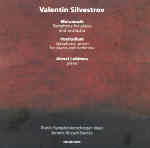Hot on the heels of ECM’s previous disc of chamber music by Valentin Silvestrov comes this equally splendid offering of two related orchestral pieces. Alexei Lubimov, the composer’s keyboard interpreter of choice, already has recorded Postludium for Sony, and there aren’t enough differences between the two versions to worry any but the most compulsively fussy collectors. On the other hand, this new issue includes Metamusik, subtitled “Symphony for piano and orchestra”, a very large, 40-minute single-movement work based on Postludium (which the composer dubs a “Symphonic poem for piano and orchestra”).
Both works begin with the same violent gesture and employ the same methods of formal construction: out of episodes of tonal confusion or painful dissonance areas of pure melodic sweetness emerge, and these two types of music alternate, with the more turbulent passages gradually calming down with each recurrence until the piece comes to rest in silence. In the quiet moments the piano often plays solo or cooperates with the orchestra in delicate, chamber-music dialogues. The more anxious or tense episodes often oppose the soloist to the orchestra, sometimes in wide arpeggios across the entire keyboard or in music clearly at some harmonic distance from the accompanying textures. It’s actually rather remarkable to note how frequently this sort of construction–essentially a sort of double variation form as Haydn originated and Beethoven made famous in the Adagio of his Ninth Symphony–appears in contemporary music today. Works recently reviewed here, ranging from Vasks’ Second Symphony to John Luther Adams’ In the White Silence, employ this same principle.
That said, Silvestrov is correct in making the distinction between symphony and symphonic poem. As befits its title, Postludium not only is more compact than Metamusik, it’s also more colorfully scored and more concerned with momentary incident and textural variety. On the other hand, the larger work has a stronger linear thrust, a more austere instrumental palette, a more obvious emphasis on development of the initial thematic material, and a wider range of contrast between episodes, and so truly does come across, at least in comparison to Postludium, as more symphonic. Certainly pianist Alexei Lubimov understands the difference and plans his contributions accordingly. Neither work taxes his virtuosity from a purely technical point of view, but both (Metamusik especially) require tremendous concentration. Lubimov is aptly mercurial and full of fantasy in Postludium, by turns grand and touchingly lyrical in Metamusik, and it goes without saying that Dennis Russell Davies elicits excellent support from the Vienna Radio Symphony Orchestra. ECM’s sonics are equally marvelous: impactful and atmospheric.
Like all of the best contemporary composers (think of Dutilleux, Rautavaara, Vasks, or Adams, to name only four) Silvestrov is one of those artists who has achieved freedom from dogma and academic inhibition, and who writes in a recognizably personal style. It would be easy to call his alternation of simple tonalities with atonal or textural episodes “poly-stylistic” were it not for the fact that his works show such a strong unity of feeling and structure. But even if his music defies categorization–indeed perhaps for this reason–it deserves to be heard by a broad and sympathetic audience. It’s marvelous, and so are these performances. [6/28/2003]
































